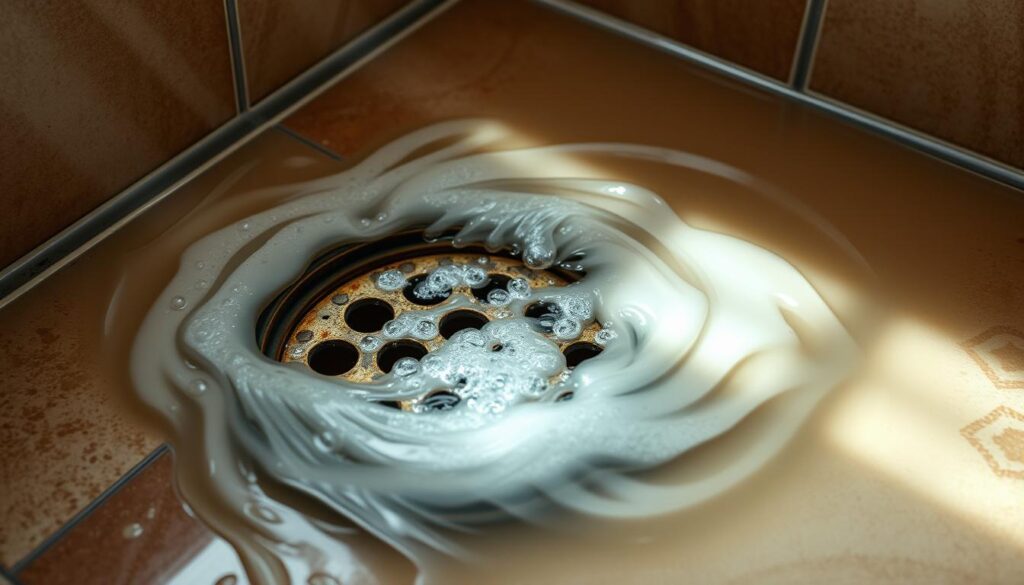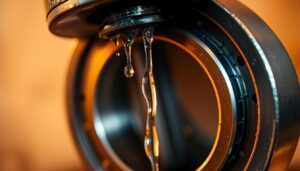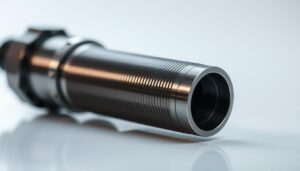Are you tired of the annoying gurgling sounds coming from your shower drain? These noises can be more than just a nuisance; they often signal underlying plumbing issues that require attention.
The drain vent system plays a crucial role in your plumbing setup, and problems here can lead to costly repairs if left unaddressed. This guide will walk you through diagnosing and fixing gurgling noises, helping you understand the root cause and apply the appropriate solution.
Key Takeaways
- Understand the common causes of gurgling noises in your shower drain.
- Learn how to diagnose issues with your drain vent system.
- Discover step-by-step fixes for plumbing problems.
- Prevent major household disruptions and costly repairs.
- Apply DIY methods to resolve gurgling drain issues.
Understanding Why Your Shower Drain Gurgles
The gurgling noise from your shower drain is more than just a nuisance; it’s a signal that something is amiss in your plumbing system. To address this issue, it’s essential to understand the role of vents and how they impact the flow of water through your drains.
The Role of Vents in Your Plumbing System
In a plumbing system, vents play a crucial role by allowing air to enter the pipes, thereby maintaining the balance of air and water. This balance is vital for the smooth operation of your drains. Without proper venting, the water in your drains can create a siphon effect, pulling water from the P-trap and potentially allowing sewer gases to enter your home.
How Air and Water Balance Affects Drainage
When the air and water balance in your plumbing system is disrupted, it can lead to gurgling sounds, slow drainage, and even foul odours. A properly functioning vent system ensures that water flows freely down the drain by maintaining pressure equilibrium. Understanding this relationship is key to diagnosing and fixing a gurgling drain.
Common Causes of Gurgling Shower Drains
If you’re experiencing gurgling sounds from your shower drain, it’s essential to identify the root cause to fix the problem effectively. Gurgling noises are often indicative of a blockage or imbalance within your plumbing system.
Clogged Pipes and Drain Obstructions
One of the primary reasons for gurgling drains is a clog or obstruction within the pipes. Accumulated hair, soap scum, and other debris can create partial blockages, restricting water flow and causing air to become trapped.
Blocked Plumbing Vents
Your plumbing system relies on vent pipes to maintain proper pressure and allow gases to escape. If these vents are blocked or improperly installed, it can disrupt airflow, leading to gurgling sounds. Vents can become blocked by leaves, bird nests, or other debris, particularly during winter months when snow or ice may cover vent openings.
Sewer Line Problems
Issues with the main sewer line, such as blockages or damage, can also cause gurgling drains. Problems like tree root intrusions, collapsed pipes, or blockages in the main line can affect multiple drains throughout your home, indicating a more serious issue that requires attention.
| Cause | Description | Impact |
|---|---|---|
| Clogged Pipes | Accumulation of hair, soap scum, and debris | Partial blockages, restricted water flow |
| Blocked Vents | Leaves, bird nests, snow, or ice covering vents | Disrupted airflow, gurgling sounds |
| Sewer Line Issues | Tree root intrusions, collapsed pipes, blockages | Gurgling in multiple drains, serious plumbing issues |
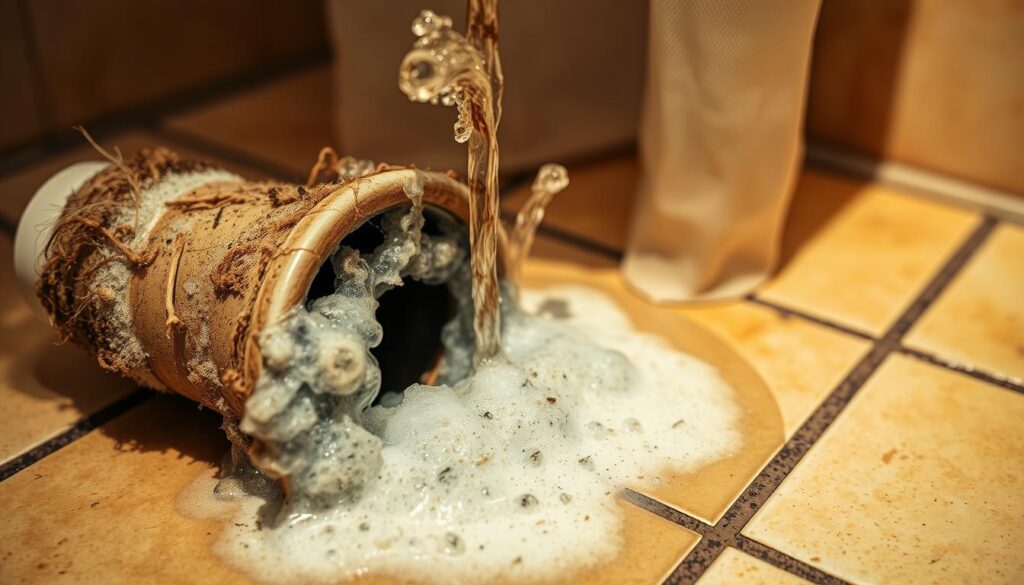
Understanding these common causes can help you identify and potentially fix the issue causing your shower drain to gurgle. Regular maintenance and inspections can prevent such problems from arising in the future.
Signs That Indicate a Drain Vent Issue
Gurgling sounds, slow drainage, and foul odours are all potential signs that your drain vent is not functioning correctly. These indicators suggest that there’s an underlying issue with your plumbing system that needs attention.
Identifying Gurgling Sounds
Gurgling sounds in your shower drain are not just annoying; they serve as a warning signal of underlying plumbing issues. Persistent gurgling, as opposed to occasional gurgling, indicates a serious vent problem that requires prompt action.
Slow Drainage and Water Backups
Slow drainage that worsens over time is a sign of a growing blockage or vent issue, particularly when multiple fixtures are affected. Water backing up in sinks or bathtubs when using appliances like washing machines often points to vent blockages.
Foul Odours from Drains
Foul, sulfurous smells from drains can indicate sewer gas escaping due to vent problems or compromised P-traps. This is not only unpleasant but also hazardous to your health, as methane can cause nausea or dizziness.
Recognising these signs early can prevent more serious issues like complete drainage failure or hazardous sewer gas accumulation in your home. If you notice air bubbles rising through your toilet bowl or water levels fluctuating, it may indicate a clogged or partially blocked vent.
Tools You’ll Need to Fix Gurgling Shower-Drain Vent
The right tools are crucial when it comes to fixing a gurgling shower-drain vent. To diagnose and fix the issue, you’ll need a variety of basic plumbing tools and safety equipment.
Basic Plumbing Tools
To tackle the problem, you’ll need a few essential plumbing tools. A plunger is necessary for dislodging clogs that are not too deep within the pipes. For more stubborn clogs, a drain snake or auger can reach deeper into the pipes to remove the obstruction. Other useful tools include pipe wrenches for adjusting or replacing pipes and a flashlight to illuminate the area you’re working on.
Safety Equipment
When working with drains, it’s crucial to have the right safety equipment. This includes gloves to protect your hands from harmful bacteria, eye protection to prevent splashes from getting into your eyes, and a respiratory mask to safeguard against sewer gases. Additionally, having buckets on hand to contain water during the repair process is also helpful.
Step-by-Step Guide to Clear Drain Obstructions
When your shower drain gurgles, it’s a sign that there’s a blockage that needs attention. Clearing these blockages can often resolve the issue, and there are several methods to achieve this.
Using a Plunger Effectively
To clear minor obstructions near the surface, use a plunger designed for shower drains. Create a tight seal, then use short, forceful plunges to dislodge the blockage. Maintain water in the shower base to improve suction.
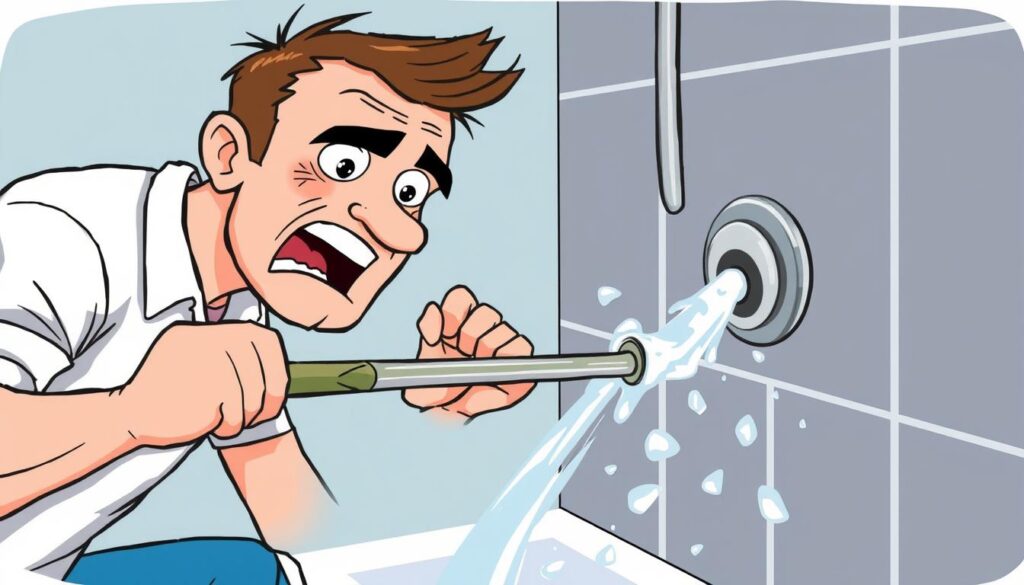
Applying Natural Cleaning Solutions
For a more environmentally friendly approach, try using a natural cleaning solution. Mix 1 cup of baking soda with 1 cup of vinegar, pour it down the drain, and let it sit for a few hours before rinsing with hot water.
Using a Drain Snake
For deeper blockages, use a manual drain snake. Feed the snake into the drain, rotating it to catch debris, then carefully extract the blockage. Be cautious not to damage the pipes.
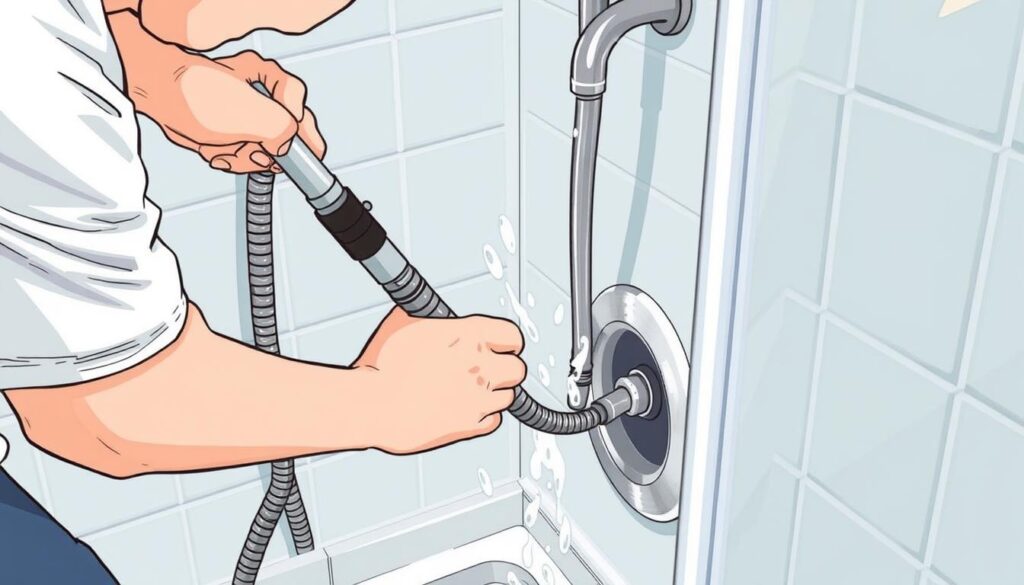
After attempting each method, test the drain to determine if the gurgling has stopped. If the issue persists, you may need to try a different approach or combine methods. Patience and persistence are key when clearing stubborn blockages.
How to Fix Gurgling Shower-Drain Vent from the Roof
The gurgling sound from your shower drain can be eliminated by inspecting and clearing the vent pipe on your roof. To do this safely and effectively, you need to understand the process involved.
Safely Accessing Your Roof
Before you start, ensure you have a sturdy ladder and consider having someone to assist you. Check the weather forecast to avoid working on a wet or slippery roof. Proper ladder placement is crucial for your safety.
Locating the Vent Pipe
The vent pipe is typically located above the bathroom area. Look for a pipe that is usually around 1.5 to 2 inches in diameter. It might have a cap on it, which you’ll need to remove for inspection.
Clearing Vent Blockages
Use a flashlight to inspect the vent pipe for debris or critters. If you spot a blockage, use a drain snake or a hose with a jet nozzle to clear it. Run water in your shower after clearing to test if the gurgling has stopped. 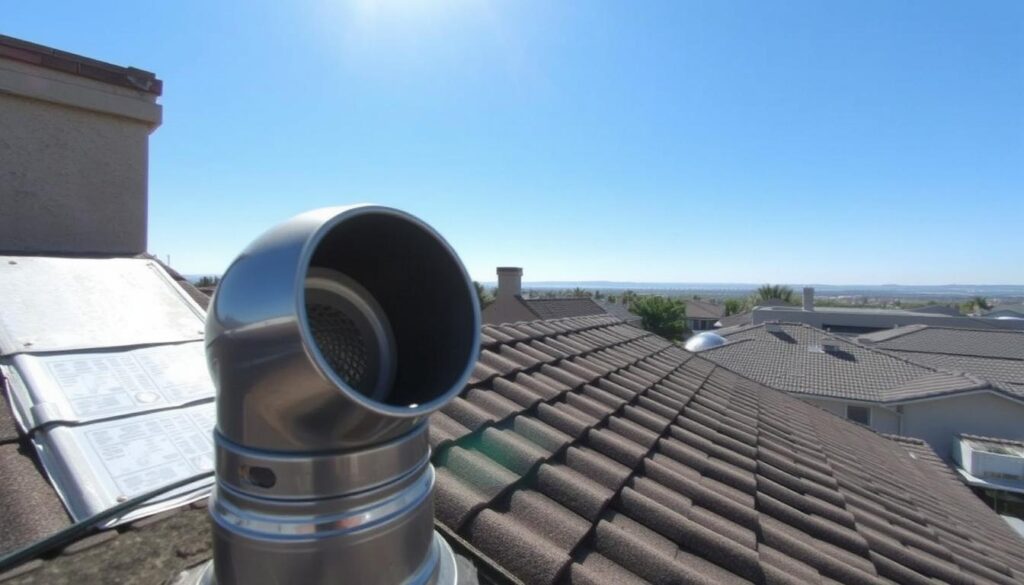
By following these steps, you can effectively fix the gurgling shower-drain vent from your roof, ensuring your plumbing system functions properly.
Addressing Vent Issues Without Roof Access
You may need to tackle vent problems from inside your home if accessing the roof is not an option. This can be a more challenging task, as it may involve removing and repairing pipes inside your home. Unless you’re experienced, it’s probably best to call a plumber if it’s not possible to unclog the vent pipe from the roof.
Interior Vent Access Points
In some homes, interior vent access points can be found in attics, crawl spaces, or behind access panels. Locating these points can provide an alternative route to clearing vent blockages. You can use specialized equipment like bladder cleaners or hydro-jetters that can be operated from these interior access points.
Alternative Venting Solutions
Temporary venting solutions, such as installing air admittance valves at strategic points, can alleviate gurgling issues while more permanent repairs are arranged. In some cases, modifying the existing vent system might be necessary, such as adding additional vents or rerouting vent pipes to improve system performance. For more information on signs of poorly vented plumbing drain lines, you can visit this article.
It’s essential to know when DIY approaches reach their limits, and professional plumbing assistance becomes necessary for complex interior vent issues. If you’re unsure about how to proceed, it’s always best to consult a professional to avoid causing further damage to your plumbing system.
Preventative Maintenance to Avoid Future Gurgling
To avoid the nuisance of a gurgling shower drain, adopting a proactive maintenance routine is essential. This involves a combination of regular drain cleaning practices and protecting your vent system.
Regular Drain Cleaning Practices
Cleaning your drains monthly using a mixture of baking soda and vinegar can help prevent build-up without damaging your pipes. Installing a drain guard to catch hair and debris is also advisable.
Protecting Your Vent System
Seasonal maintenance of roof vents, including clearing debris and installing vent guards, can prevent blockages. For more information on fixing gurgling drains, visit this resource.
| Maintenance Task | Frequency |
|---|---|
| Clean drains with baking soda and vinegar | Monthly |
| Inspect and clean roof vents | Seasonally |
| Check drain guards for blockages | Weekly |
Conclusion
Gurgling shower drains are more than just a nuisance; they signal potential issues within your home’s plumbing system. By understanding the causes, such as blockages or venting problems, you can take steps to resolve them. This guide has outlined DIY methods to fix gurgling shower-drain vents, saving you significant repair costs. Regular maintenance is key to preventing future issues and extending the lifespan of your plumbing system. Address gurgling sounds promptly to avoid more serious problems. With the right tools and techniques, you can maintain a properly functioning shower drain.
